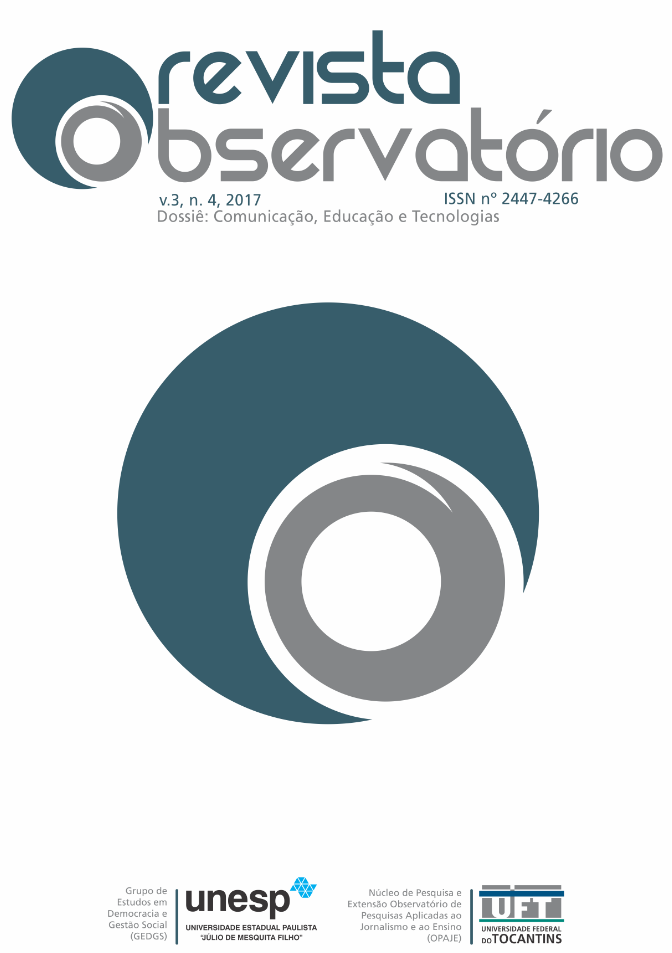#UERJRESISTE: DIGITAL PERSONAL STORIES IN TIME OF CRISIS
DOI:
https://doi.org/10.20873/uft.2447-4266.2017v3n4p92Keywords:
digital stories, cyberculture, resistanceAbstract
Cyberculture, our contemporary culture, creates new relationships between technology and social life. Thus, new spaces mediated by the digital technologies in network arise, in which many practices of authorship are structured and developed. The ways of narrating have been diversified, the liberation of the emission pole with web 2.0 and the development of hypermedia language has enabled not only a new way of telling stories, but also of sharing and disseminating them in networks. In this context, the present paper aims to understand the digital stories of professional development that have emerged during the context of crisis that the State University of Rio de Janeiro (UERJ) has been facing since the end of 2014 until the present time (March 2017). The movement of struggle and repudiation #UERJResiste shows us how social networks on the Internet act as spaces of authorship where indignation and hope give rise to multiple manifestations. Within this movement, the #SouUERJ campaign emerges as a protest device that uses the power of digital professional development stories and narration of personal stories in hypermedia language, resulting in a powerful creation of positioning, struggle and resistance.
Downloads
References
ALVES, Nilda. A narrativa como método na história do cotidiano escolar. In: I CONGRESSO BRASILEIRO DE HISTÓRIA DA EDUCAÇÃO. Anais: Educação no Brasil: história e historiografia. Río de Janeiro, 2000.
BRUNER, Jerome. Fabricando Histórias: Direito, Literatura, Vida. São Paulo: Letra e Voz, 2014.
LAMBERT, Joe. Digital Storytelling: capturing lives, creating community. Berkeley: Digital Diner Press, 2002.
LEMOS, André. O futuro da Internet: em direção a uma ciberdemocracia planetária. Lemos, A e Lévy, P. São Paulo: Paulus, 2010.
MADDALENA, Tania.; SEVILLA PAVÓN, Ana. El Relato Digital como propuesta pedagógica en la formación continua de profesores. Revista Iberoamericana de Educación, n. 65, p.149-160, jul. 2014. Disponível em: <http://www.rieoei.org/rie65a09.pdf> (Acesso em 15/04/16).
SANTAELLA, Lucia. Linguagens liquidas na era da mobilidade. São Paulo: Paulus, 2007.
SANTAELLA, Lucia. A ecologia pluralista da comunicação: conectividade, mobilidade, ubiquidade. São Paulo: Paulus, 2010.
SANTAELLA, Lucia. Comunicação ubíqua. Repercuções na cultura e na educação. São Paulo: Paulus, 2013.
SANTOS, Edméa. Pesquisa-formação na cibercultura. Lisboa, Portugal: Whitebooks, 2014.
SARLO, Beatriz. Tempo passado: cultura da memória e guinada subjetiva. São Paulo: Companhia das Letras; Belo Horizonte: UFMG, 2007.
SOUZA, Elizeu Clementino de. Pesquisa narrativa e escrita (auto) biográfica: interfaces metodológicas e formativas. In: Sousa, E., C. de e Abrahão, M.H. (Orgs) Tempos, Narrativas e Ficções: a invenção de si. Salvador: EDUNEB, 2006.
THOMSON, Alistair. Recompondo a memória – questões sobre a relação entre a história oral e as memórias. Projeto Historia, São Paulo, n.15: Ética e História Oral, p.13-33, abr.1997.
Downloads
Published
How to Cite
Issue
Section
License
[PT] Autores que publicam nesta revista concordam com os seguintes termos:
1. Autores mantém os direitos autorais e concedem à revista, sem pagamento, o direito de primeira publicação, com o trabalho simultaneamente licenciado sob a Creative Commons Attribution License (CC BY-NC 4.0), permitindo o compartilhamento do trabalho com reconhecimento da autoria do trabalho e publicação inicial nesta revista.
Leia todos os termos dos direitos autorais aqui.

